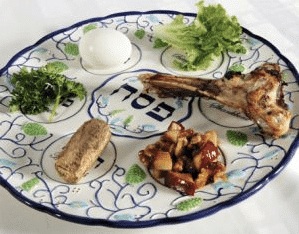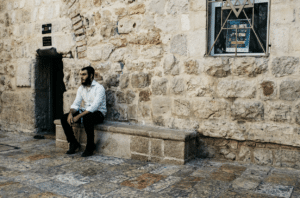In a fantastically multi-sensory way, the Feast of Passover pictures the salvation and deliverance of the Israel from Egypt, and foreshadows the salvation that the Messiah would work for the whole world one and a half thousand years later. It is a festival of freedom – from slavery, and from sin. It is no accident that the Jewish year starts at this point, according to God’s word to Moses: “This month shall be your beginning of months; it shall be the first month of the year to you” (Exodus 12:2). This is God’s way of letting us know the cosmic significance of the coming events. The clock starts here.
Celebrating Passover as a Christian
Whether or not Christians should celebrate Passover is a matter of personal conscience. Like all other Jewish Feasts, it is a foreshadowing of Yeshua… Passover speaks of his atoning work as the Lamb of God. Colossians 2:16-17 tells us that we should “let no one judge us in food or in drink, or regarding a festival or a new moon or Sabbaths…” Christians are no longer bound to observe the Passover Feast the way the Jewish people were commanded to according to the Bible, but it is very interesting and beneficial to dig into the symbolism nonetheless. By studying and celebrating this feast that was designed by God himself, we can enrich our understanding of his salvation story, and dig up all the clues, hints and pointers that he has woven in there for our instruction. He uses sight, smell, taste and touch as well as hearing and experiencing the story to teach us the truths that he wants us to grasp.
Behold, the Lamb of God who takes away the sin of the world!
Most of the Passover story is laid out in Exodus 12-13. The Israelites were commanded by God to take the blood of a lamb—one without blemish, that had been thoroughly checked and inspected for four days—and put it on the doorposts of their houses. When the angel of the Lord saw the innocent blood, he would “pass over” that house. Similarly, when we accept Yeshua as our Savior we apply His atoning sacrifice to our lives, and spiritually put His shed blood on the doorposts of our spiritual houses. Then God delivers us from the penalty of death and sets us free from the bondage of sin.
The Last Supper was a Passover meal which Yeshua ate with his disciples. The people were required to present their lambs to the priest for inspection four days before Passover. It was on this very this day, four days before Passover, that Yeshua, rode into Jerusalem on a donkey to shouts of “Hosanah!” Which means, “Save us!” For the next four days, the religious leaders grilled and tested him, but he passed the test with flying colours. He is the spotless Passover lamb.
Celebrating Passover: Rabbinic Traditions with Messianic meaning
Many of the rituals associated with the traditional Passover seder have not originated in the Bible but have been created by the Jewish Rabbis after the destruction of the temple. Even though they seem to be man-made traditions instituted by those who rejected Yeshua, they have the Holy Spirit’s fingerprints all over them, unintentionally pointing to truths about the Messiah and the message of the cross.
The Passover festival requires some serious preparations. For many days before the holiday eve, the observant Jewish families thoroughly clean their houses removing everything that contains yeast or leaven to fulfill the commandment in Exodus 12:19; “For seven days no yeast is to be found in your houses.” This preparation can teach believers in Yeshua many lessons. There is a spiritual preparation that is surely reflected here. The Apostle Paul in 1 Corinthians 5:7-8 challenges us to “Purge out the old leaven that we might be a new lump and keep the feast with unleavened bread of sincerity and truth..” In the Bible leaven represents sin and evil. The clear point here is that God wants evil out of our lives. After we are saved, the sanctification process continues and must go on every day of our lives.
Yeshua was betrayed and arrested on the Feast of Passover. He was crucified, striped and pierced, wrapped in white linen and buried during the Feast of the Unleavened Bread that begins right after the Passover day. Today, matza (the unleavened bread) is striped and pierced for fast baking to ensure no leavening occurs. On the Passover table there are three special Matzot wrapped in a white cloth. The top one represents God in Heaven, the bottom piece is people down on earth, and the middle one is the Mediating Priest. At the beginning of the meal this middle piece is broken, wrapped in a white cloth and hidden away. The children of the house search for it after the meal. When they find it, it is eaten with the third cup of wine, called the Cup of Redemption. What a beautiful and strikingly clear picture of Yeshua in this ritual! Yeshua said, “Whoever does not receive the kingdom of God as a little child will by no means enter it” (Luke 18:17).
What’s on the seder plate?

The Passover meal is eaten while reclining on pillows around the table which signifies that those who eat it are no longer slaves but free people! On the seder table there is a plate with various foods. Some are eaten and others are there to remind us of the many miracles God performed when He delivered Israelis out of Egypt.
A lamb bone represents the Passover sacrifice, the bitter herbs remind us of the life of slavery in Egypt but can also remind us of the bitterness of sin. Charoset is a sweet paste the texture of which reminds us of the clay with which the bricks were made in Egypt, but its sweetness can also remind us of the presence of the Lord that brings sweetness into most difficult situations. Dipping karpas (parsley or celery) into saltwater reminds us of the crossing the Red Sea. Israel went in as slaves and came out on the other side as a free people. It was almost like baptism, a symbolic representation of our death to sin and beginning of a new life with Yeshua. The egg is a later addition to the seder plate. Some say it represents the Jewish people who despite severe persecution survived as a nation for 4,000 years. The egg is the only food that gets harder the more you cook it, just like believers in Yeshua become stronger when they go through pressure and trials.
Do Christians celebrate Passover?
If you are able to attend a Passover seder meal with a Jewish family it can be a very meaningful and enlightening event. Christians can gain so much from this experience as they learn of God’s faithfulness to the children of Israel when He brought them out of Egypt into a whole new life of freedom.















